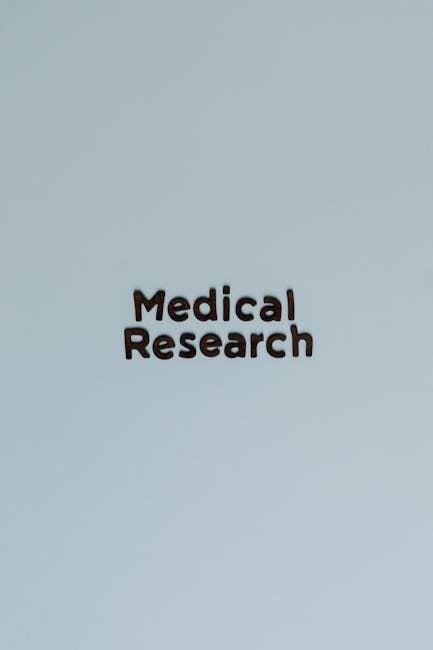Pharmacology study guides are essential for understanding drug mechanisms, classification, and clinical applications․ Free PDF resources provide comprehensive materials, making learning accessible and efficient for students and professionals alike․
What is Pharmacology?
Pharmacology is the scientific study of drugs, their origins, effects, and mechanisms of action․ It examines how drugs interact with biological systems, focusing on therapeutic benefits, side effects, and toxicity․ This field bridges chemistry, biology, and medicine, aiming to optimize drug therapy and improve human health through evidence-based practices․
The Purpose of a Pharmacology Study Guide
A pharmacology study guide serves as a structured resource for learning key drug concepts, mechanisms, and clinical applications․ It provides summarized information, diagrams, and practice questions, aiding students and professionals in mastering complex topics efficiently․ These guides are designed to enhance understanding and retention of pharmacological principles through organized and accessible content․
Why Use Free PDF Resources for Pharmacology Studies?
Free PDF resources offer cost-effective access to comprehensive pharmacology materials, including study guides and notes․ These resources are easily downloadable, portable, and often include diagrams and summaries, making them ideal for self-study․ They provide convenience and flexibility, allowing learners to access essential information anytime, enhancing their understanding of pharmacological concepts without financial barriers․

Key Concepts in Pharmacology
Pharmacology explores drug mechanisms, classification, and interactions․ Core concepts include pharmacokinetics, pharmacodynamics, and receptor interactions, essential for understanding therapeutic effects, dosing, and potential side effects of medications․
Drug Classification and Mechanisms of Action
Drugs are classified by therapeutic effects, chemical structure, and names․ Their mechanisms of action involve receptor interactions, enzyme inhibition, or ion channel modulation․ Free PDF guides detail how drugs like beta-blockers or NSAIDs work, aiding students in understanding pharmacodynamics and clinical uses, essential for precise drug administration and minimizing side effects․
Pharmacokinetics and Pharmacodynamics
Pharmacokinetics explores drug absorption, distribution, metabolism, and excretion, while pharmacodynamics examines drug effects and receptor interactions․ Free PDF guides detail these processes, linking drug concentrations to therapeutic responses․ Understanding these principles aids in optimizing dosing regimens, enhancing efficacy, and minimizing adverse effects, crucial for safe and effective pharmacotherapy in clinical practice․
Drug Receptors and Molecular Pharmacology
Drug receptors are molecular targets where drugs bind, triggering therapeutic effects․ Molecular pharmacology examines these interactions, focusing on how drugs alter cellular functions․ Free PDF guides detail receptor types, ligand binding, and signaling pathways, providing insights into drug design, specificity, and efficacy, essential for understanding drug action at the molecular level․
Where to Find Free Pharmacology Study Guides
Free pharmacology study guides are available on platforms like Google Scholar, university websites, and open-access repositories․ These resources offer comprehensive PDF materials for students and professionals․
Popular Online Platforms for Free Pharmacology PDFs
Google Scholar, ResearchGate, and university websites offer free pharmacology PDFs․ Platforms like Scribd and SlideShare also provide accessible study materials․ Open-access repositories and academic forums are excellent sources for downloading comprehensive pharmacology guides․
University Resources and Open-Access Materials
Many universities offer free pharmacology study guides through their websites․ Open-access platforms like Coursera and edX provide lecture notes and study materials․ Institutional repositories and libraries also host PDFs on pharmacology topics, ensuring high-quality, peer-reviewed content is freely available for educational purposes․
Free Pharmacology Study Notes and Summaries
Free pharmacology study notes and summaries are widely available online, covering key topics like drug administration and interactions․ These concise materials are ideal for quick revision and focus on essential concepts, making them valuable tools for students preparing for exams or seeking to reinforce their understanding of pharmacology․
Important Topics in Pharmacology Study Guides
Important pharmacology topics include drug administration, dosage forms, side effects, and therapeutic effects․ These areas help students link theory to clinical practice effectively․
Drug Administration and Dosage Forms
Understanding drug administration routes and dosage forms is crucial․ Routes include oral, IV, and topical, while dosage forms like tablets, capsules, and injections impact absorption and efficacy․ Proper administration ensures therapeutic effects and minimizes adverse reactions, making it a cornerstone of pharmacology studies․
Side Effects and Drug Interactions
Side effects are unintended drug reactions, while interactions involve drugs affecting each other’s efficacy or increasing toxicity․ Understanding these is vital for safe prescribing․ Examples include Enoxaparin’s bleeding risks and drug-food interactions․ Studying these concepts helps minimize adverse outcomes and optimize therapeutic regimens, ensuring patient safety and effective treatment outcomes․
Therapeutic Effects and Clinical Applications
Therapeutic effects focus on how drugs treat diseases by targeting specific biological pathways․ Clinical applications explore their use in real-world scenarios, such as anti-inflammatory drugs for conditions like systemic sclerosis․ These concepts emphasize the practical use of pharmacological agents in patient care, optimizing treatment strategies for various medical conditions effectively․

How to Effectively Use a Pharmacology Study Guide
Use active learning techniques, such as highlighting and note-taking, to engage with content․ Focus on understanding drug mechanisms and interactions to build a strong foundation for clinical applications․
Study Strategies for Pharmacology Students
Pharmacology students should adopt structured study strategies, such as creating flashcards for drug classifications and mechanisms, setting weekly review goals, and engaging in active learning through practice questions․ Utilizing free PDF guides can enhance understanding by providing concise summaries and visual aids, making complex concepts more manageable and retention easier over time․
Practical Tips for Mastering Pharmacology Concepts
Mastering pharmacology requires breaking down complex topics into manageable parts․ Use free PDF guides to focus on key drug classes, their mechanisms, and clinical uses․ Prioritize understanding pharmacokinetics and dynamics, and regularly test knowledge with practice questions․ Organizing notes and linking theory to real-world cases enhances comprehension and retention effectively over time․
Using Flashcards and Summarization Techniques
Flashcards are an excellent tool for memorizing drug names, mechanisms, and effects․ Summarization helps condense complex concepts into digestible notes․ Both methods enhance active learning, promoting better retention and recall of pharmacology principles․ Regular review and spaced repetition further improve understanding, making these techniques indispensable for mastering pharmacology concepts efficiently․

Creating Your Own Pharmacology Study Guide
Tailor your guide to your learning needs, including diagrams, drug summaries, and key references․ Organize content logically, ensuring clarity and ease of access for effective studying and review․
Organizing Notes and Key Information
Organize your notes by drug classification, mechanisms, and clinical uses․ Include summaries, diagrams, and key terms․ Use clear headings and subheadings for easy navigation․ Incorporate real-world examples and case studies to enhance understanding․ Regularly update with the latest research and cross-reference with reliable sources to ensure accuracy and relevance․
Including Diagrams and Visual Aids
Diagrams and visual aids, such as drug mechanism illustrations and pharmacokinetic graphs, enhance understanding․ Incorporate flowcharts for metabolic pathways and 3D models of drug-receptor interactions․ Use color-coding to highlight key terms and concepts․ Interactive visuals, like videos or animations, can further clarify complex processes, making your study guide engaging and effective for learners․
Supplementing with Video and Audio Resources
Enhance your study guide with video tutorials explaining complex drug mechanisms and audio summaries for on-the-go learning․ Podcasts discussing recent pharmacology research and lecture recordings from experts can deepen understanding․ Multimedia resources cater to diverse learning styles, making pharmacology concepts more accessible and engaging for students and professionals alike․ Utilize playlists and channels for structured learning․
Online Communities and Forums for Pharmacology Students
Join online forums and communities to connect with peers, discuss complex topics, and access shared resources․ Platforms like Reddit and specialized pharmacology groups offer valuable insights and support for students․
Popular Forums and Discussion Groups
Reddit’s r/Pharmacology, Student Doctor Network, and Pharmacology Forum are popular platforms for students to discuss topics, share resources, and seek advice․ These communities foster engagement, collaborative learning, and access to diverse perspectives, making them invaluable for understanding complex pharmacology concepts and staying updated on the latest research and clinical applications․
Engaging with Peers for Better Understanding
Collaborative learning with peers enhances comprehension of pharmacology concepts․ Sharing insights and perspectives through discussions can clarify doubts and deepen understanding․ Engaging in study groups or online forums fosters a supportive environment for exploring complex topics and applying theoretical knowledge to real-world scenarios․
Sharing and Accessing Free Study Materials
Accessing free pharmacology study guides online offers a wealth of resources for learners․ Platforms provide downloadable PDFs, notes, and summaries, enabling easy sharing among peers․ These materials cover essential topics like drug mechanisms and interactions, making them invaluable for both individual and group study sessions․

Pitfalls to Avoid When Using Free Study Guides
Ensure the accuracy of free pharmacology study guides by verifying sources․ Avoid outdated content and supplement with credible materials for a comprehensive understanding․
Ensuring the Accuracy of Information
Verify the credibility of sources when using free pharmacology study guides․ Peer-reviewed materials and reputable authors ensure reliability․ Cross-reference with trusted journals or textbooks to confirm accuracy and relevance, especially for critical concepts like drug mechanisms and interactions․ Updated content is essential for effective learning and application in clinical settings․
Avoiding Outdated or Irrelevant Content
When using free pharmacology study guides, prioritize materials with recent publication dates․ Outdated information, especially on drug approvals or research advancements, can mislead learners․ Focus on content aligned with current curriculum standards or clinical practices to ensure relevance and effectiveness in understanding modern pharmacological principles and applications․
Understanding the Limitations of Free Resources
Free pharmacology study guides may lack depth on advanced topics or specialized drugs, focusing mainly on basics․ They often omit interactive features and updates, which can hinder comprehensive understanding․ Additionally, some PDFs may contain advertisements or require registration, potentially limiting accessibility for certain users seeking concise, ad-free study materials․

Extending Your Knowledge Beyond Study Guides
Explore advanced pharmacology topics, recent research, and specialized fields to deepen your understanding of drug mechanisms and therapeutic applications beyond foundational study materials․
Advanced Topics in Pharmacology
Delve into molecular pharmacology, personalized medicine, and cutting-edge drug discovery․ Explore topics like targeted therapies, biologics, and gene therapy, aligning with recent research trends․ These advanced areas emphasize innovative approaches to drug development and therapeutic interventions, offering insights into the future of pharmacology and its applications in modern medicine․
Staying Updated with Recent Research
Stay current with pharmacology research by accessing free PDF guides and scholarly articles․ Regularly review scientific journals, attend webinars, and explore open-access platforms for the latest discoveries․ Engage with academic communities and utilize online resources to keep abreast of advancements in drug development, clinical trials, and therapeutic innovations in the field of pharmacology․
Exploring Specialized Fields in Pharmacology
Specialized fields like molecular pharmacology and neuropharmacology offer deeper insights into drug mechanisms․ Free PDF guides provide detailed overviews of these areas, enabling students to explore niche topics such as cancer pharmacology or immunopharmacology․ These resources often include case studies and research summaries, making complex subjects more accessible for focused learning and professional development․

Applying Pharmacology Knowledge in Clinical Practice
Pharmacology study guides help bridge theory and practice, enabling healthcare professionals to apply drug knowledge effectively․ Free PDF resources offer practical insights into real-world scenarios, enhancing clinical decision-making and patient care․
Linking Theory to Real-World Scenarios
Pharmacology study guides provide practical examples, connecting theoretical concepts to clinical cases․ Free PDFs include case studies, enabling learners to apply drug mechanisms and interactions to real patient scenarios, enhancing their ability to make informed decisions in healthcare settings and improving patient outcomes through evidence-based practices․
Case Studies and Practical Examples
Free pharmacology study guides often include detailed case studies and practical examples, such as drug administration for conditions like systemic sclerosis․ These resources provide real-world scenarios, enabling students to understand drug mechanisms, dosages, and monitoring practices, making complex pharmacological concepts more relatable and easier to apply in clinical settings․
Future Directions in Pharmacology Practice
Future pharmacology practice focuses on advancing personalized medicine, optimizing drug delivery systems, and integrating molecular pharmacology with emerging technologies․ Free study guides highlight these trends, emphasizing the importance of tailored therapies and innovative research to enhance patient outcomes and address unmet medical needs effectively․
Free pharmacology study guides offer invaluable resources for mastering drug mechanisms and clinical applications․ Continuous learning and practical application of concepts are key to excelling in pharmacology studies․
Summarizing Key Takeaways
Free pharmacology study guides provide essential insights into drug mechanisms, classification, and clinical applications․ They emphasize pharmacokinetics, pharmacodynamics, and drug interactions․ Utilizing free PDF resources ensures accessible learning, while continuous practice and review enhance understanding․ These guides are invaluable for students and professionals seeking to master pharmacology concepts efficiently and effectively․
Encouragement for Continuous Learning
Continuous learning is crucial in pharmacology due to its dynamic nature․ Free PDF study guides offer updated resources to stay informed about drug advancements and research․ Regular review and engagement with study materials enhance understanding and application of pharmacological principles, fostering improved patient care and professional growth in the field of pharmacology․
Final Recommendations for Pharmacology Students
Leverage free pharmacology study guides and PDF resources to enhance your learning․ Prioritize active learning techniques like self-testing and summarization․ Regularly review key concepts and stay updated with recent research․ Consult multiple sources to cross-verify information accuracy․ Engage with online forums for shared insights and continuous improvement in mastering pharmacology effectively․